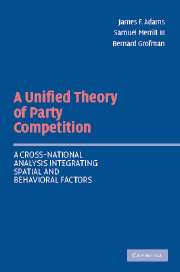 A Unified Theory of Party Competition
A Unified Theory of Party Competition Published online by Cambridge University Press: 04 December 2009
Introduction
In this chapter, we report further empirical applications to the 1988 French presidential election, which provide tests of the theoretical arguments presented in Chapters 3 and 4. These analysesmove beyond the empirical results on France presented earlier, in that here we explore candidate competition under more complex voting models that incorporate multiple policy dimensions and numerous nonpolicy motivations in addition to partisanship. We also discuss whether the French political context plausibly motivated voters to discount the presidential candidates' capacity to implement the policy positions they advocated. Such discounting would lead voters to prefer candidates who proposed policies that were more extreme than the voters' own beliefs – that is, policies that when discounted or moderated would be in line with the voters' preferences. We present empirical results suggesting that French voters did indeed behave as if they discounted candidates' positions in the 1988 presidential election.
For each multidimensional model that we investigate – a policy-only model, a unified model that includes nonpolicy as well as policy factors, and a unified discounting model that includes voter discounting of candidate positions in addition to policy and nonpolicy factors – we report equilibrium analyses, and we compare the candidates' equilibrium positions to their actual advocated policies as perceived by the voters. We also explore whether these alternative voting models gave the candidates electoral incentives to represent faithfully their partisans' policy beliefs, the linkage that underlies the responsible party model of policy representation.
To save this book to your Kindle, first ensure [email protected] is added to your Approved Personal Document E-mail List under your Personal Document Settings on the Manage Your Content and Devices page of your Amazon account. Then enter the ‘name’ part of your Kindle email address below. Find out more about saving to your Kindle.
Note you can select to save to either the @free.kindle.com or @kindle.com variations. ‘@free.kindle.com’ emails are free but can only be saved to your device when it is connected to wi-fi. ‘@kindle.com’ emails can be delivered even when you are not connected to wi-fi, but note that service fees apply.
Find out more about the Kindle Personal Document Service.
To save content items to your account, please confirm that you agree to abide by our usage policies. If this is the first time you use this feature, you will be asked to authorise Cambridge Core to connect with your account. Find out more about saving content to Dropbox.
To save content items to your account, please confirm that you agree to abide by our usage policies. If this is the first time you use this feature, you will be asked to authorise Cambridge Core to connect with your account. Find out more about saving content to Google Drive.